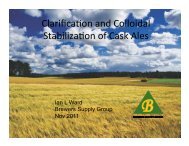Program Book - Master Brewers Association of the Americas
Program Book - Master Brewers Association of the Americas
Program Book - Master Brewers Association of the Americas
Create successful ePaper yourself
Turn your PDF publications into a flip-book with our unique Google optimized e-Paper software.
Technical Session XIII: Microbiological<br />
Moderator: Dirk Bendiak, Molson-Coors Brewing Company,<br />
Etobicoke, ON, Canada<br />
Dirk Bendiak received his B.S. degree (Hon.) in genetics from <strong>the</strong><br />
University <strong>of</strong> Alberta in 1975 and his Ph.D. degree in molecular<br />
biology from York University in 1980. He began work at Molson<br />
Breweries Canada Ltd. in 1981 as a senior microbiologist. In<br />
1995 he began work as <strong>the</strong> corporate operations specialist for<br />
Molson Canada, delving into areas <strong>of</strong> brewing and packaging<br />
troubleshooting. As <strong>of</strong> June 1999, he has been back in <strong>the</strong> Brewing<br />
Department as <strong>the</strong> microbiology and brewing specialist, working<br />
on optimization <strong>of</strong> yeast propagation and yeast management<br />
practices, microbiological issues, CIP issues, malt issues, and<br />
brewhouse capability studies. In April 2000 he was <strong>the</strong> corporate<br />
brewer responsible for licensed brewing in Canada. In July 2001<br />
his role changed to specialist, brewing and packaging quality, with<br />
responsibilities for licensed brewing, troubleshooting, and quality<br />
performance improvement. In April 2005 Dirk became as <strong>the</strong><br />
manager, quality services, responsible for <strong>the</strong> analytical, sensory,<br />
and microbiology services for <strong>the</strong> corporate group. He is currently<br />
<strong>the</strong> manager <strong>of</strong> quality services in <strong>the</strong> Molson Toronto brewery. He<br />
is a member <strong>of</strong> <strong>the</strong> ASBC and is serving on <strong>the</strong> Technical Committee<br />
and has been program chair, subcommittee chair, and president. He<br />
is also a member <strong>of</strong> <strong>the</strong> MBAA, American Society <strong>of</strong> Microbiologists,<br />
and Canadian Genetics Society and an associate member <strong>of</strong> <strong>the</strong><br />
Institute <strong>of</strong> Brewing.<br />
O-45<br />
Development <strong>of</strong> detection medium for hard-to-culture beer<br />
spoilage lactic acid bacteria<br />
KOJI SUZUKI (1), Shizuka Asano (1), Tomoo Ogata (1), Yasushi<br />
Kitagawa (1)<br />
(1) Asahi Breweries, Ltd., Research Laboratories <strong>of</strong> Brewing<br />
Technology, Ibaraki, Japan<br />
Beer spoilage lactic acid bacteria (LAB) are generally difficult to<br />
detect using culture media. Among beer spoilage LAB, Lactobacillus<br />
paracollinoides and Lactobacillus lindneri strains are found in hardto-culture<br />
states upon primary isolation from brewery environments<br />
and <strong>of</strong>ten cause microbiological incidents without being detected<br />
by quality control tests in breweries. Never<strong>the</strong>less, detection media<br />
have <strong>of</strong>ten been evaluated with easy-to-culture beer spoilage LAB<br />
strains that are maintained in nutrient-rich laboratory media, an<br />
environment considerably different from those found in nature. This<br />
study <strong>the</strong>refore aimed to acquire hard-to-culture beer spoilage LAB<br />
as bioresources and develop a medium for detecting <strong>the</strong>se groups<br />
<strong>of</strong> microorganisms. Four hard-to-culture beer spoilage LAB strains,<br />
belonging to L. paracollinoides and L. lindneri, were obtained by<br />
repeatedly subculturing <strong>the</strong> wild-type strains in beer. In contrast<br />
to <strong>the</strong> wild-type counterparts, <strong>the</strong>se beer-adapted strains were<br />
found to be hardly detectable on MRS agar, a typical medium for<br />
detecting beer spoilage LAB in <strong>the</strong> brewing industry. To develop<br />
a countermeasure against <strong>the</strong>se hard-to-culture beer spoilage<br />
LAB, a beer-based medium was modified. As a consequence, <strong>the</strong><br />
supplementation <strong>of</strong> a small amount <strong>of</strong> MRS medium was found<br />
to enhance <strong>the</strong> growth <strong>of</strong> <strong>the</strong> hard-to-culture beer spoilage LAB<br />
strains obtained in this study. In addition, sodium acetate was<br />
shown to improve <strong>the</strong> selectivity <strong>of</strong> this beer-based medium. Fur<strong>the</strong>r<br />
comparative study was performed with five o<strong>the</strong>r media widely used<br />
for <strong>the</strong> detection <strong>of</strong> beer spoilage LAB in <strong>the</strong> brewing industry. This<br />
experiment revealed that <strong>the</strong> newly developed medium, designated<br />
ABD medium, possessed superior sensitivity for hard-to-culture<br />
beer spoilage LAB and comparable sensitivity with easy-to-culture<br />
beer spoilage LAB. Moreover, ABD medium was found to suppress<br />
<strong>the</strong> growth <strong>of</strong> nonspoilage microorganisms and <strong>the</strong>reby allow <strong>the</strong><br />
selective growth <strong>of</strong> beer spoilage LAB, a feature not observed with<br />
o<strong>the</strong>r detection media. These results suggest that <strong>the</strong> detection by<br />
ABD medium can be used as an indicator for differentiating <strong>the</strong><br />
beer spoilage ability <strong>of</strong> LAB without additional confirmatory tests<br />
in breweries. Fur<strong>the</strong>r field studies with ABD medium revealed that<br />
more than half <strong>of</strong> <strong>the</strong> test samples collected in this study contained<br />
hard-to-culture beer spoilage LAB, suggesting considerable<br />
proportions <strong>of</strong> beer spoilage LAB are in hard-to-culture states in<br />
beer and related environment. Taken toge<strong>the</strong>r, ABD medium is<br />
considered an effective tool for comprehensive detection <strong>of</strong> beer<br />
spoilage LAB in breweries.<br />
Koji Suzuki received a M.S. degree in agricultural chemistry from<br />
Tokyo University, Japan. He joined Asahi Breweries, Ltd. in April<br />
1992 as a microbiologist. Since April 2003, he has functioned as<br />
chief researcher in <strong>the</strong> Research Laboratories <strong>of</strong> Brewing Technology<br />
and principally studied beer spoilage microorganisms. He received<br />
a Ph.D. degree from Tokyo University in 2004 and an award from<br />
<strong>the</strong> Brewing Society <strong>of</strong> Japan in 2007 for his work concerning hop<br />
resistance to beer spoilage lactic acid bacteria. He is currently a vicechair<br />
<strong>of</strong> BCOJ Analysis Committee and also serves on <strong>the</strong> editorial<br />
board <strong>of</strong> <strong>the</strong> Journal <strong>of</strong> <strong>the</strong> Institute <strong>of</strong> Brewing.<br />
87



